KET词汇练习答案(1-3)
- 格式:pdf
- 大小:221.74 KB
- 文档页数:1

ket考试真题试卷答案KET考试真题试卷答案听力部分Section 1: 多项选择题1. A) The man is looking for a new job.2. B) The woman is going to a party.3. C) The train is delayed.4. A) The woman is asking for directions to the library.5. B) The man is suggesting they go to the cinema.Section 2: 填空题6. The meeting is scheduled for _10:00 AM_.7. The project deadline is _next Friday_.8. The woman needs to _email_ the report.9. The man is going to _print_ the documents.10. They will discuss the _budget_ at the meeting.Section 3: 匹配题11. A) The woman is talking about her holiday plans.12. B) The man is discussing his new job.13. C) The woman is complaining about her neighbor.14. A) The man is asking for advice about a gift.15. B) The woman is recommending a restaurant.阅读和写作部分16. B) The article is about the benefits of cycling to work.17. A) The author suggests that walking can improve mental health.18. C) The study found that regular exercise can reduce therisk of heart disease.19. A) The benefits of exercise can be achieved in short bursts.20. C) The article concludes that physical activity should bea part of daily life.Part 2: 完形填空21. A) Despite22. B) opportunity23. C) significantly24. A) However25. B) regularlyPart 3: 写作任务26. 根据题目要求,写一篇不少于80字的短文,描述你上周末的活动。
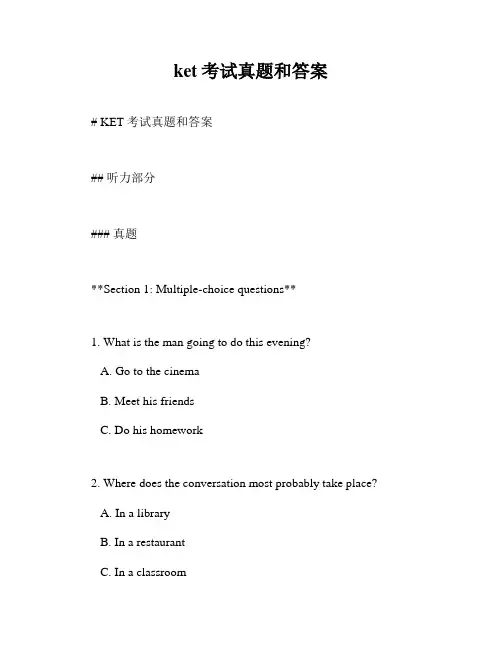
ket考试真题和答案# KET考试真题和答案## 听力部分### 真题**Section 1: Multiple-choice questions**1. What is the man going to do this evening?A. Go to the cinemaB. Meet his friendsC. Do his homework2. Where does the conversation most probably take place?A. In a libraryB. In a restaurantC. In a classroom3. Why does the woman want to buy a new computer?A. Her old one is brokenB. She needs it for workC. She wants to play games### 答案1. B. Meet his friends2. C. In a classroom3. A. Her old one is broken## 阅读和写作部分### 真题**Part 1: Multiple-choice questions**1. What does the article mainly talk about?A. The history of the internetB. The benefits of using the internetC. The dangers of using the internet2. According to the article, which of the following is a positive effect of the internet?A. It helps people to avoid social interactionB. It can lead to addictionC. It provides access to a wealth of information3. What is the author's opinion about online privacy?A. It is not a serious issueB. It is a growing concernC. It is impossible to protect### 答案1. B. The benefits of using the internet2. C. It provides access to a wealth of information3. B. It is a growing concern**Part 2: Writing**Write an email to your friend about your recent school trip. (Write at least 50 words.)### 真题Dear [Friend's Name],I hope this email finds you well. I wanted to tell you about our school trip last week. We went to the local museum and it was really interesting. We learned about the history of our town and saw some ancient artifacts. It was a great day out and I think you would have enjoyed it too. I took some photos that I will send you later. How have you been? I can't wait to hear from you.Best,[Your Name]### 答案Dear [Friend's Name],I hope this email finds you well. I wanted to tell you about our school trip last week. We went to the local museum and it was really interesting. We learned about the history of our town and saw some ancient artifacts. It was a great day out and I think you would have enjoyed it too. I took some photos that I will send you later. How have you been? I can't wait to hear from you.Best,[Your Name]## 口语部分### 真题**Part 1: Interview**1. What is your name?2. How old are you?3. What is your favorite subject at school?### 答案1. My name is [Your Name].2. I am [Your Age] years old.3. My favorite subject at school is [Your Favorite Subject].**Part 2: Long turn**Describe a place you like to visit in your free time. (Say why you like it and what you usually do there.)### 真题A place I like to visit in my free time is the local park. I like it because it's a quiet and peaceful place where I can relax and enjoy nature. I usually go there to read a book or have a picnic with my family. It's a great place to unwind after a busy week.### 答案A place I like to visit in my free time is the local park. I like it because it's a quiet and peaceful place where I can relax and enjoy nature. I usually go there to read a book or have a picnic with my family. It's a great place to unwind after a busy week.请注意,以上提供的真题和答案仅供参考,实际的KET考试内容和格式可能会有所不同。
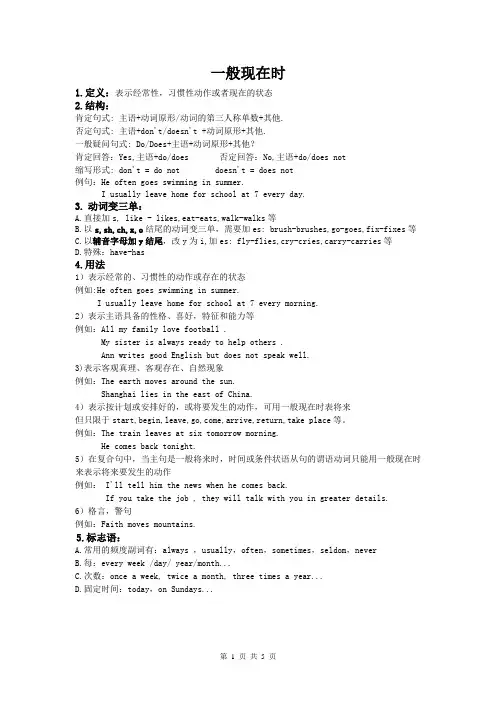
一般现在时1.定义:表示经常性,习惯性动作或者现在的状态2.结构:肯定句式: 主语+动词原形/动词的第三人称单数+其他.否定句式: 主语+don't/doesn't +动词原形+其他.一般疑问句式: Do/Does+主语+动词原形+其他?肯定回答:Yes,主语+do/does 否定回答:No,主语+do/does not缩写形式: don't = do not doesn't = does not例句:He often goes swimming in summer.I usually leave home for school at 7 every day.3.动词变三单:A.直接加s, like - likes,eat-eats,walk-walks等B.以s,sh,ch,x,o结尾的动词变三单,需要加es: brush-brushes,go-goes,fix-fixes等C.以辅音字母加y结尾,改y为i,加es: fly-flies,cry-cries,carry-carries等D.特殊:have-has4.用法1)表示经常的、习惯性的动作或存在的状态例如:He often goes swimming in summer.I usually leave home for school at 7 every morning.2)表示主语具备的性格、喜好,特征和能力等例如:All my family love football .My sister is always ready to help others .Ann writes good English but does not speak well.3)表示客观真理、客观存在、自然现象例如:The earth moves around the sun.Shanghai lies in the east of China.4)表示按计划或安排好的,或将要发生的动作,可用一般现在时表将来但只限于start,begin,leave,go,come,arrive,return,take place等。
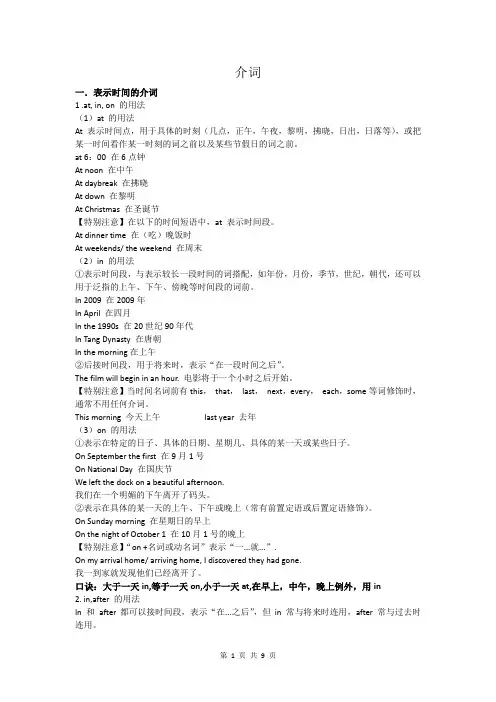
介词一.表示时间的介词1 .at, in, on 的用法(1)at 的用法At 表示时间点,用于具体的时刻(几点,正午,午夜,黎明,拂晓,日出,日落等),或把某一时间看作某一时刻的词之前以及某些节假日的词之前。
at 6:00 在6点钟At noon 在中午At daybreak 在拂晓At down 在黎明At Christmas 在圣诞节【特别注意】在以下的时间短语中,at 表示时间段。
At dinner time 在(吃)晚饭时At weekends/ the weekend 在周末(2)in 的用法①表示时间段,与表示较长一段时间的词搭配,如年份,月份,季节,世纪,朝代,还可以用于泛指的上午、下午、傍晚等时间段的词前。
In 2009 在2009年In April 在四月In the 1990s 在20世纪90年代In Tang Dynasty 在唐朝In the morning在上午②后接时间段,用于将来时,表示“在一段时间之后”。
The film will begin in an hour. 电影将于一个小时之后开始。
【特别注意】当时间名词前有this,that,last,next,every,each,some等词修饰时,通常不用任何介词。
This morning 今天上午last year 去年(3)on 的用法①表示在特定的日子、具体的日期、星期几、具体的某一天或某些日子。
On September the first 在9月1号On National Day 在国庆节We left the dock on a beautiful afternoon.我们在一个明媚的下午离开了码头。
②表示在具体的某一天的上午、下午或晚上(常有前置定语或后置定语修饰)。
On Sunday morning 在星期日的早上On the night of October 1 在10月1号的晚上【特别注意】“on +名词或动名词”表示“一...就...”.On my arrival home/ arriving home, I discovered they had gone.我一到家就发现他们已经离开了。
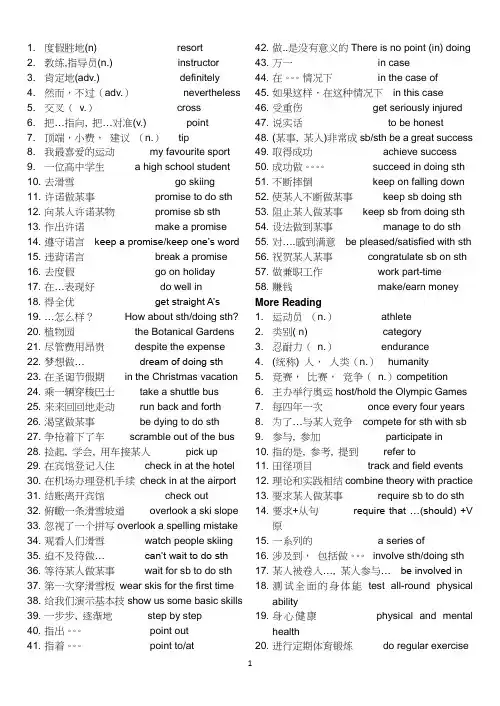
1. 度假胜地(n) resort2. 教练,指导员(n.) instructor3. 肯定地(adv.) definitely4. 然而,不过(adv.)nevertheless5. 交叉(v.)cross6. 把…指向, 把…对准(v.) point7. 顶端,小费,建议(n.)tip8. 我最喜爱的运动my favourite sport9. 一位高中学生 a high school student10. 去滑雪go skiing11. 许诺做某事promise to do sth12. 向某人许诺某物promise sb sth13. 作出许诺make a promise14. 遵守诺言keep a promise/keep one’s word15. 违背诺言break a promise16. 去度假go on holiday17. 在…表现好do well in18. 得全优get straight A’s19. …怎么样?How about sth/doing sth?20. 植物园the Botanical Gardens21. 尽管费用昂贵despite the expense22. 梦想做… dream of doing sth23. 在圣诞节假期in the Christmas vacation24. 乘一辆穿梭巴士take a shuttle bus25. 来来回回地走动run back and forth26. 渴望做某事be dying to do sth27. 争抢着下了车scramble out of the bus28. 捡起, 学会, 用车接某人pick up29. 在宾馆登记入住check in at the hotel30. 在机场办理登机手续check in at the airport31. 结账离开宾馆check out32. 俯瞰一条滑雪坡道overlook a ski slope33. 忽视了一个拼写overlook a spelling mistake34. 观看人们滑雪watch people skiing35. 迫不及待做… can’t wait to do sth36. 等待某人做某事wait for sb to do sth37. 第一次穿滑雪板wear skis for the first time38. 给我们演示基本技show us some basic skills39. 一步步, 逐渐地step by step40. 指出。
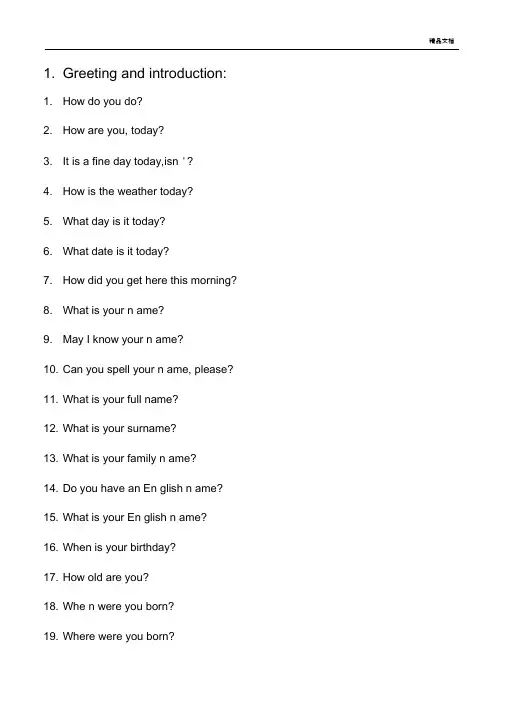
1. Greeting and introduction:1. How do you do?2. How are you, today?3. It is a fine day today,isn '?4. How is the weather today?5. What day is it today?6. What date is it today?7. How did you get here this morning?8. What is your n ame?9. May I know your n ame?10. Can you spell your n ame, please?11. What is your full name?12. What is your surname?13. What is your family n ame?14. Do you have an En glish n ame?15. What is your En glish n ame?16. When is your birthday?17. How old are you?18. Whe n were you born?19. Where were you born?20. Were you born in Xuzhou?21. Were you born in this city?22. Are you a local pers on?23. Are you n ative to this area?24. Where are you from?25. Where do you come from?26. Where is your birthplace?27. Where do you live?28. Do you live in this city?29. What school are you study ing at?30. Which grade are you in?31. Is your home far away from your school?32. How far is your home from your school?33. How long does it take you to get to school?34. What time do you go to school?35. How do you get to school?36. Which class are you in?37. How many students are there in your class?38. How many boys/girls are there in your class?39. Do you like your school/class?40. What do you thi nk of your school/class?41. What is your school/class like?42. What does your school/class look like?43. Is there a library at your school?44. Does your school have a Readi ng Club/E nglish cor ner?45. What do you usually do at En glish corner?46. Whe n does the first less on start?47. Whe n do you come home from school every day?48. What do you usually do betwee n classes?49. How many subjects do you have?50. What are they?51. What is your favorite subject?52. Why do you like it best?53. What do you thi nk of En glish?54. Is En glish hard or easy for you?55. Do you like lear ning En glish?56. What is your Englishteacher name?57. Why do you like En glish/ Math/ Chi nese?58. Are you good at En glish?59. Do you do well in PE?60. What subject are you good at?61. Are you tired after your lessons? Are you tired when school is finished?62. What do you do after school?63. Do you read En glish every day?64. Do you like sports? What kind of sport do you like best? Why?65. How ofte n do you do it?2. Daily life and abilities:66. How many people are there in your family? Who are they?67. How many family members do you have?68. Do you love your family?69. How old is your father/mother?70. What is your father ' s/moth^ob? s71. What does your father/mother do?72. How does your father/mother go to work?73. Do you often help your parents with housework? What do you do?74. When is yourfather ' s/motherirthday?75. Do you have any brothers or sisters? (sibli ngs)76. How ofte n do you visit your gran dpare nts?77. How many rooms are there in your flat/house?78. How much homework do you do every day?79. Can you finish your homework by yourself?80. Can you cook at home?81. Do you like an imals?82. What an imals do you like?83. Do you have a pet?84. What is the pet ' name?85. Can you describe your pet?86. Can you say somethi ng about your pet?87. What time do you get up every day?88. What time do you have breakfast/ lun ch/d inner?89. What do you have for breakfast/l un ch/d inner?90. What kind of food do you like best? Why?91. What is your favorite food? Why?92. Where do you usually have lun ch/d inner?93. Do you like eati ng fruit?94. What is your favorite fruit? Why?95. What do you usually do in the eve ning?96. What do you do in your free time?97. What is your hobby? What do you like to do in your spare time?98. What time do you usually go to bed?99. What do you usually do on weeke nds?100. What did you do last weeke nd/ last summer holiday?101. Did you go on a holiday last year?102. Can you say someth ing about your last weeke nd/ last summer holiday? 103. Do you have a plan for this weekend/this summer holiday?104. What will you do this weeke nd/this summer holiday?105. What are you going to do tomorrow/ next weeke nd?106. What do you usually do at Mid-autu mn Festival/Hallowee n/Christmas? 107. What did you do last Mid-autumn Festival/ Halloween (万圣节前夕)/ Christmas(圣诞节)108. Do you like Spri ng Festival? Why?109. What is your hobby?110. Why do you like doi ng it?111. Do you know how to use a computer?112. Do you like play ing computer games?113. What about the grade you got in the rece nt exam?114. Do you have many frien ds? Who are they?115. Do you like making frie nds?116. Do you have a pen pal/pe n friend?笔友)117. What is his/her name?118. Who is your best friend?119. What is your best frie nd name?120. What does he/she look like?121. What do you usually do with your frien ds/ family? 122. Who is your favorite sin ger/ dan cer/ pop star? 123. Which season do you like best? Why?124. Do you like readi ng books? Why?125. Do you like story books?126. Do you like telli ng stories?127. Do you like cartoo ns? Why?128. Can you make a model pla ne/ train?129. Can you play the pia no?130. Can you play football/ basketball?131. What sort of music do you like?132. What color do you like best?133. What color is your coat/ your school bag?134. How much are your shoes?135. Where do you want to visit?136. Where do you want to go on holiday?137. Do you have a bike?138. Can you ride a bike?139. How ofte n do you go to a park/ zoo/ cin ema?3. Other:140. Tell me something about your hobbies/pet/family/house/school/your class/ your father/ your weekend/ last holiday ........ ?141. Can you describe the weather today?142. What do you like doing in spring/ winter/ autumn/ summer? Why?143. How do you celebrate Spring Festival/ Drag on Boat Festival/ Christmas? 144. What is your difference from other students in your class?145. How many seas ons are there in a year?146. How many days are there in a week?147. How many mon ths are there in a year?148. How many sec onds are there in a minu te?149. How many minu tes are there in an hour?150. What is thirtee n and nin e?151. What is thirtee n minus nine?152. Have you ever been to *****?153. What do you thi nk of it?154. Have you bee n to any other coun tries?155. Do you like traveli ng?156. What cities have you been to?157. Can you say someth ing about your hometow n? 158. What are you going to do whe n you grow up? 159. What are you going to be whe n you grow up? 160. Which middle school do you like best? Why? 161. Which middle school do you want to go to? Why?。

KET 官方口语题库Test 11. Greeting and introduction: How do you do?How are you, today?It is a fine day today, i sn’t?How is the weather today?What day is it today?What date is it today?How did you get here this morning? What is your name?May I know your name?Can you spell your name, please? What is your full name?What is your surname?What is your family name?Do you have an English name? What is your English name?When is your birthday?How old are you?When were you born?Where were you born?Were you born in Xuzhou?Were you born in this city?Are you a local people?Are you native?Where are you from?Where do you come from?Where is your birthplace?Where do you live?Do you live in this city?What school are you studying at?Which grade are you in?Is your home far away from your school? How far is your home from your school? How long does it take you to get to school? When do you go to school every day?How do you get to school every day? Which class are you in?How many students are there in your class? How many boys/girls are there in your class? Do you like your school/class?How do you think of your school/class? What is your school/class like?What does your school/class look like?Is there a library at your school?Does your school have a Reading Club/English comer? What do you usually do at English comer?When does the first lesson start?When do you come home from school every day? What do you usually do between classes?How many subjects do you have? What are they? What subjects do you have?What is your favorite subject? Why do you like it best? How do you think of English, easy or difficult?Is English hard or easy for you?Do you like learning English?What is your English teacher name?Why do you like English/Math/Chinese?Are you good at English?Do you do well in PE?What subject are you good at?Are you tired after lessons a day?What do you do after school?Do you read English every day?Do you like sports?What kind of sport do you like best? Why? How often do you do it?2. Daily life and abilities:How many people are there in your family? Who are they?How many family members do you have?Do you love your family?How old is your father/mother?What is your father/mother's job?What does your father/mother do?How does your father/mother go to work?Do you often help your parents with housework? For example? When is your father/mother's birthday?Do you have any brothers or sisters?How often do you visit your grandparents?How many rooms are there in your flat/house?How much homework do you do every day?Can you finish your homework by yourself?Can you cook at home?Do you like animals?What animals do you like?Do you have a pet?What is this pet's name?Can you describe your pet?Can you say something about your pet?What time do you get up every day?What time do you have breakfast/lunch/dinner?What do you have for breakfast/lunch/dinner?What kind of food do you like best? Why?What is your favorite food? Why?Where do you usually have lunch/dinner?Do you like eating fruit?What is your favorite fruit? Why?What do you usually do in the evening?What do you do in your free time?What is your bobby or interest in your spare time?What time do you usually go to bed?What do you usually do on weekends?What did you do last weekend/ last summer holiday?Did you go on a holiday last year?Can you say something about your last weekend/ last summer holiday? Do you have a plan of this weekend/this summer holiday?What will you do this weekend/this summer holiday?What are you going to do tomorrow/next weekend?What do you usually do at Mid-autumn Festival/Halloween/Christmas? What did you do last Mid-autumn Festival/Halloween/Christmas?Do you like Spring Festival? Why?What is your hobby? Why do you like doing it?Do you know how to use a computer?Do you like playing computer games?What about the grade you got in the recent exam?Do you have many friends? Who are they?Do you like making friends?Do you have a pen pal/pen friend? What is his/her name? Who is your best friend?What is your best friend name?What does he/she look like?What do you usually do with your friends/family?Who is your favorite singer/dancer/pop star?Which season do you like best? Why?Do you like reading books? Why?Do you like story books?Do you like telling stories?Do you like cartoons? Why?Can you make a model plane/train?Can you play the piano?Can you play football/basketball?What sort of music do you like?What color do you like best?What color is your coat/your school bag?How much are your shoes?Where do you want to visit?Where do you want to go on holiday?Do you have a bike?Can you ride a bike?How often do you go to a park/zoo/cinema?3. Others:Tell me something about your hobbies/pet/family/house/school/class/ Your father/your weekend/last holiday…?Can you describe the weather today?What do you like doing in spring winter/autumn/summer? Why?How do you celebrate Spring Festival/Dragon Boat Festival/Christmas? What is your difference from other students in your class?How many seasons are there in a year?How many days are there in a week?How many months are there in a year?How many seconds are there in a minute?How many minutes are there in an hour?What is thirteen and nine?What is thirteen minus nine?Have you ever been to*****? What do you think of it? Have you been to any other countries?Do you like traveling?What cities have you ever been to?Can you describe something about your hometown? What are you going to do when you grow up?What are you going to be when you grow up? Which middle school do you like best? Why?。
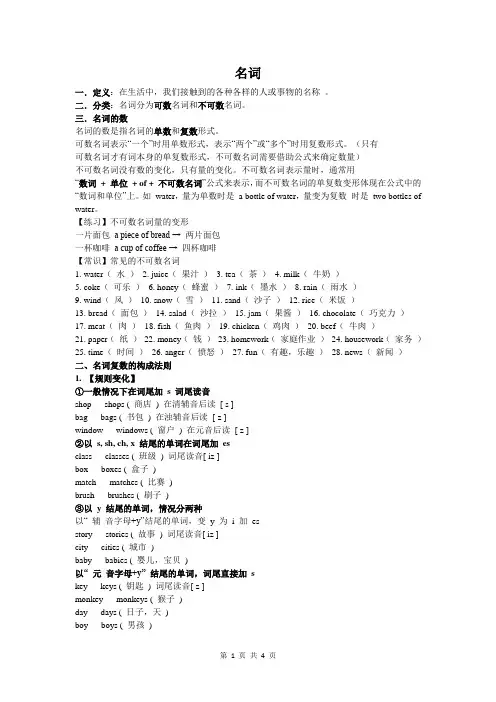
名词一.定义:在生活中,我们接触到的各种各样的人或事物的名称。
二.分类:名词分为可数名词和不可数名词。
三.名词的数名词的数是指名词的单数和复数形式。
可数名词表示“一个”时用单数形式,表示“两个”或“多个”时用复数形式。
(只有可数名词才有词本身的单复数形式,不可数名词需要借助公式来确定数量)不可数名词没有数的变化,只有量的变化。
不可数名词表示量时,通常用“数词+ 单位+ of + 不可数名词”公式来表示,而不可数名词的单复数变形体现在公式中的“数词和单位”上。
如water,量为单数时是a bottle of water,量变为复数时是two bottles of water。
【练习】不可数名词量的变形一片面包a piece of bread → 两片面包_______________________一杯咖啡a cup of coffee → 四杯咖啡_______________________【常识】常见的不可数名词1. water(水)2. juice(果汁)3. tea(茶)4. milk(牛奶)5. coke(可乐)6. honey(蜂蜜)7. ink(墨水)8. rain(雨水)9. wind(风)10. snow(雪)11. sand(沙子)12. rice(米饭)13. bread(面包)14. salad(沙拉)15. jam(果酱)16. chocolate(巧克力)17. meat(肉)18. fish(鱼肉)19. chicken(鸡肉)20. beef(牛肉)21. paper(纸)22. money(钱)23. homework(家庭作业)24. housework(家务)25. time(时间)26. anger(愤怒)27. fun(有趣,乐趣)28. news(新闻)二、名词复数的构成法则1. 【规则变化】①一般情况下在词尾加s 词尾读音shop --- shops ( 商店) 在清辅音后读[ s ]bag --- bags ( 书包) 在浊辅音后读[ z ]window --- windows ( 窗户) 在元音后读[ z ]②以s, sh, ch, x 结尾的单词在词尾加esclass --- classes ( 班级) 词尾读音[ iz ]box --- boxes ( 盒子)match --- matches ( 比赛)brush --- brushes ( 刷子)③以y 结尾的单词,情况分两种以“ 辅音字母+y”结尾的单词,变y 为i 加esstory --- stories ( 故事) 词尾读音[ iz ]city --- cities ( 城市)baby --- babies ( 婴儿,宝贝)以“ 元音字母+y” 结尾的单词,词尾直接加skey --- keys ( 钥匙) 词尾读音[ z ]monkey --- monkeys ( 猴子)day --- days ( 日子,天)boy --- boys ( 男孩)④以o 结尾的名词,复数一般在词尾加s ,但个别加estomato --- tomatoes ( 西红柿) 词尾读音[ z ]potato --- potatoes ( 土豆)zoo --- zoos ( 动物园)photo --- photos ( 照片)⑤以f 或fe 结尾的词,多数变 f 或fe 为vesleaf --- leaves ( 树叶) 词尾读音[ vz ]knife --- knives ( 小刀)roof --- roofs ( 屋顶)2. 【不规则变化】man --- men ( 男人) woman --- women ( 女人)child --- children ( 儿童) foot --- feet ( 脚) goose-geese(鹅)mouse --- mice ( 老鼠) tooth ---teeth ( 牙齿)sheep --- sheep ( 绵羊) deer --- deer (鹿)fish --- fish(鱼,同一种类)【国籍问题】Chinese --- Chinese(中国人)Japanese --- Japanese(日本人)Englishman --- Englishmen(英国人)Frenchman --- Frenchmen(法国人)【特别注意】集体名词:名词本身就代表复数。

介词一.表示时间的介词1 .at, in, on 的用法(1)at 的用法At 表示时间点,用于具体的时刻(几点,正午,午夜,黎明,拂晓,日出,日落等),或把某一时间看作某一时刻的词之前以及某些节假日的词之前。
at 6:00 在6点钟At noon 在中午At daybreak 在拂晓At down 在黎明At Christmas 在圣诞节【特别注意】在以下的时间短语中,at 表示时间段。
At dinner time 在(吃)晚饭时At weekends/ the weekend 在周末(2)in 的用法①表示时间段,与表示较长一段时间的词搭配,如年份,月份,季节,世纪,朝代,还可以用于泛指的上午、下午、傍晚等时间段的词前。
In 2009 在2009年In April 在四月In the 1990s 在20世纪90年代In Tang Dynasty 在唐朝In the morning在上午②后接时间段,用于将来时,表示“在一段时间之后”。
The film will begin in an hour. 电影将于一个小时之后开始。
【特别注意】当时间名词前有this,that,last,next,every,each,some等词修饰时,通常不用任何介词。
This morning 今天上午last year 去年(3)on 的用法①表示在特定的日子、具体的日期、星期几、具体的某一天或某些日子。
On September the first 在9月1号On National Day 在国庆节We left the dock on a beautiful afternoon.我们在一个明媚的下午离开了码头。
②表示在具体的某一天的上午、下午或晚上(常有前置定语或后置定语修饰)。
On Sunday morning 在星期日的早上On the night of October 1 在10月1号的晚上【特别注意】“on +名词或动名词”表示“一...就...”.On my arrival home/ arriving home, I discovered they had gone.我一到家就发现他们已经离开了。
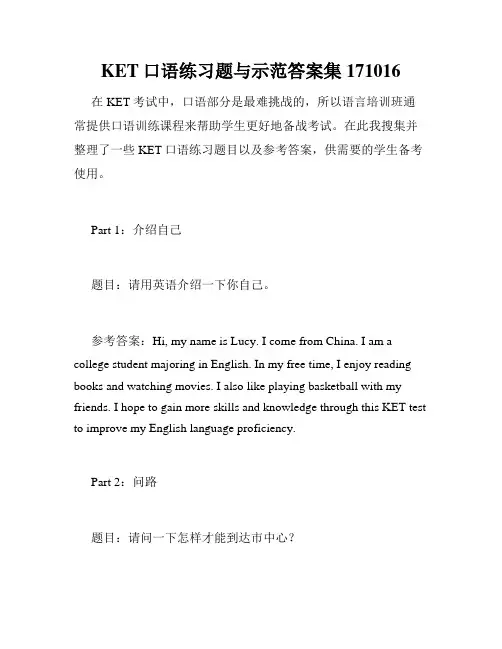
KET口语练习题与示范答案集171016在KET考试中,口语部分是最难挑战的,所以语言培训班通常提供口语训练课程来帮助学生更好地备战考试。
在此我搜集并整理了一些KET口语练习题目以及参考答案,供需要的学生备考使用。
Part 1:介绍自己题目:请用英语介绍一下你自己。
参考答案:Hi, my name is Lucy. I come from China. I am a college student majoring in English. In my free time, I enjoy reading books and watching movies. I also like playing basketball with my friends. I hope to gain more skills and knowledge through this KET test to improve my English language proficiency.Part 2:问路题目:请问一下怎样才能到达市中心?参考答案:Excuse me, can you tell me how to get to the city center? I am a bit lost here.答案2:I'm not familiar with this place, could you tell me how to get to the city center?Part 3:环保题目:你认为人们应该怎样活得更环保?参考答案:I think people should start with small things to live a more environmentally friendly life. For example, we can reduce the usage of plastic bags and bring our own shopping bags. We can also use public transportation more often instead of driving a car. And we should recycle as much as we can to reduce the waste we produce. These small changes can add up to make a big difference.Part 4:家庭生活题目:你认为一个完美的家庭应该是什么样子?参考答案:For me, a perfect family is one where everyone loves and supports each other no matter what happens. Open communication is also very important in a family so that everyone can express their feelings and thoughts freely. And most importantly, a family should always be there for each other through both happy and tough times.。
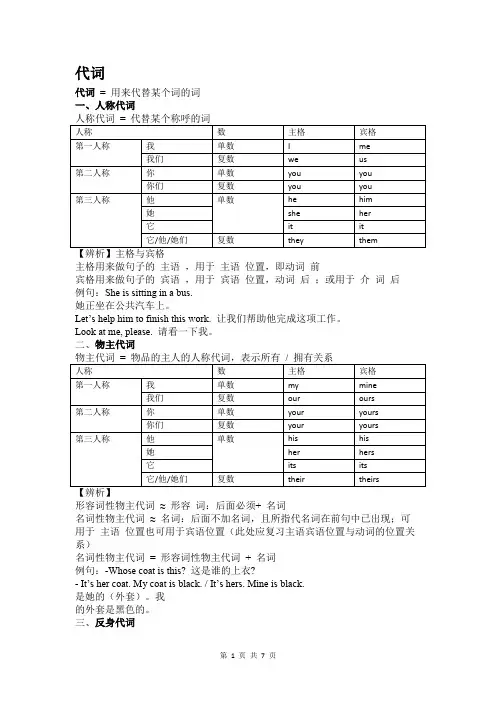
代词代词= 用来代替某个词的词一、人称代词主格用来做句子的主语,用于主语位置,即动词前宾格用来做句子的宾语,用于宾语位置,动词后;或用于介词后例句:She is sitting in a bus.她正坐在公共汽车上。
Let’s help him to finish this work. 让我们帮助他完成这项工作。
Look at me, please. 请看一下我。
二、物主代词形容词性物主代词≈ 形容词:后面必须+ 名词名词性物主代词≈ 名词:后面不加名词,且所指代名词在前句中已出现;可用于主语位置也可用于宾语位置(此处应复习主语宾语位置与动词的位置关系)名词性物主代词= 形容词性物主代词+ 名词例句:-Whose coat is this? 这是谁的上衣?- It’s her coat. My coat is black. / It’s hers. Mine is black.是她的(外套)。
我的外套是黑色的。
三、反身代词己,他只能说他自己,你不能说他自己)例句:I can do it by myself. 我能自己做这件事。
四、指示代词this ( 这个 )------- these ( 这些 ) that ( 那个 )------- those ( 那些 ) here ( 这里 )------- there ( 那里)冠词一.分类:冠词分为不定冠词和定冠词。
二.不定冠词不定冠词:a 或 an ,指人或事物的某一种类,表示“ 一个 ” 。
She is a teacher. 她是一名老师。
That’s an orange. 那是一个桔子。
辨析:a 用在辅音发音前,如 a desk, a tree, a hand, a uniform定冠词:the ,特指某些人、某些物,或指说话人与听话人彼此知道的人或物,或是在上文提到过的人或物。
This is a bus. The bus is very big这是一辆公交车。
连词一、并列连词:(一)常见的表示语义延伸的并列连词有:1. and:和Justice is on your side. And justice will triumph over injustice. 正义在你们一边,而正义是会战胜非正义的。
2. neither... nor:既不...也不...She could neither speak the language nor write it. 这种语言她既不会说,也不会写。
3. both A and B: A和B都...A man should have both courage and perseverance.一个人既要有勇气又要有毅力。
4. not only... but also:不仅...而且...We should not only be bold, but also be cautious. 我们不仅要大胆,而且要谨慎。
5. as well as:和I have read one of his novels as well as a few of his plays. 我读过他的一本小说和几个剧本。
(二)表示选择的并列连词有:1.or :或者You may do it yourself, or ask someone else to do it. 你可以自己做或者让别人做。
2.either... or:不是...就是...I left it either on the table or in the drawer. 我不是把它放在桌子上了,就是放在抽屉里了。
除了表示选择外,or和either... or还可以表示否定的条件:1) Now I must go or (if not) I shall be late for the party. 我现在得走了,否则晚会我就要迟到了。
2) You'll either behave yourself, or you'll never go out with me. 你要么老实点,要么就永远不能跟我一起出去。
单词练习Day 1Food and Drink(1)barbecue_____ chips _____ biscuit_____a bit of cake_____ 汉堡:_____ 瓶子: _____ sandwich: _____ 咖啡:_____ 厨师: _____ cooker:_____ 午餐: _____ dinner:_____饥饿的:_____ ice cream: _____ 一条面包:_____ 果汁: _____ kitchen_____ 刀:_____lemon(n.): _____ 早餐: _____ pizza_____一杯水:_____ potato: _____ 西红柿:_____碗:_____ café: _____ 肉:_____ chocolate_____ plate:_____ 果酱:_____ salad:_____ 汤:_____ 一碗汤:_____cream: _____ 零食:_____Exercise:1. The first meal of the day: b_ _ _ _ _ ___.2. Two slices of bread with a layer of meat between them: s_ _ _ _ _ _ _.3. A type of food made from flour and water together and baked: b_ _ _ _.4. A large piece of equipment for cooking food. c_ _ _ _ _.5. A deep round dish with a wide open top: b_ _ _.答案:barbecue烧烤chips 薯片 biscuit 饼干a bit of cake(n.)一块蛋糕汉堡:burger 瓶子:bottle sandwich:三文治咖啡:coffee 厨师:cookcooker:厨具午餐:lunchdinner:晚餐一条面包:a loaf of bread 饥饿的:hungry ice cream冰淇淋果汁:juice:厨房kitchen 刀:knifelemon(n.):柠檬早餐:breakfast pizza比萨一杯水:a glass of water 土豆 potato(n.): 西红柿:tomato碗:bowl café:咖啡馆肉:meat chocolate巧克力plate:碟子果酱:jam salad:沙拉汤:soup 一碗汤:a bowl of soup cream:奶油零食:snackExercise:1. The first meal of the day: breakfast.2. Two slices of bread with a layer of meat between them: sandwich.3. A type of food made from flour and water together and baked: bread4. A large piece of equipment for cooking food. Cooker5. A deep round dish with a wide open top: bowlKET冲刺备考单词练习二Job and Work(1)actor._____女演员:_____businessman:_____医生:_____司机:_____earn:_____nurse:_____医院:_____官员:_____工程师:_____dancer:_____老师:_____pilot:_____艺术家:_____football player:_____篮球运动员:_____explorer:_____学生:_____清洁工/清洁器(剂):_____电脑:_____farmer:_____职业:_____painter:_____厨师:_____ chemist:_____colleague:_____公司:_____顾客:_____dentist:_____diploma:_____ housewife:_____制服:_____guide:_____ hairdresser:_____instructions:_____journalist:_____ Exercise:1.A man who performs on the stage,on television or in films.a____.2.A person whose jobs involves designing and building engines,machines etc. e_______.3.A person who operates the controls of an aircraft.p____.4.A person who owns or manages a farm.f_____.5.A person who travel to unknown places to find out more.e_______.KET单词练习Day5Place:town and city村庄_______城镇_________城市_______building(n.)_____机场_______city centre_______ apartment(n.)_____flat(n./a.)_______公共汽车站_____街道_______road(n.)_______桥梁________停车场________square(n.)_______市场_____lift(n./v.)_______castle(n.)_______农场,农田_____corner(n.)_____exit(n.)_____block(n.)________railway station________办公室_______地铁_________俱乐部_____银行,堤岸_____ exhibition(n.)_____petrol station________entrance(n.)_______ church(n.)_____cathedral(n.)_____motorway(n.)________ college(n.)______KET英英释义练习题:1.A place where aircraft land and take off.a______2.The door through which you can leave a public building.e___3.A structure that is built over a river so that people or vehicles can cross from one side to the other.b_____4.A road in a city,town,or village,usually with houses along it.s_____5.A place where goods are bought and sold,usually outdoors.m_____Week3Place:town and city【答案】村庄village城镇town城市citybuilding(n.)建筑物机场airport city centre市中心apartment(n.)公寓套房flat(n./a.)公寓,平坦的公共汽车站bus stop/station 街道street road(n.)道路桥梁bridge停车场car park square(n.)广场市场marketlift(n./v.)电梯castle(n.)城堡农场,农田fieldcorner(n.)角落,拐角exit(n.)出口block(n.)街区railway station火车站办公室office地铁underground俱乐部club银行,堤岸bank exhibition(n.)展览会petrol station加油站entrance(n.)入口church(n.)教堂cathedral(n.)大教堂motorway(n.)高速公路college(n.)大学KET英英释义练习题:1.A place where aircraft land and take off.airport2.The door through which you can leave a public building.exit3.A structure that is built over a river so that people or vehicles can cross from one side to the other.bridge4.A road in a city,town,or village,usually with houses along it.street5.A place where goods are bought and sold,usually outdoors.marketPlace:buildings工厂_____________café___________医院___________商店_____________disco___________电影院___________游泳池___________书店______________旅店_____________图书馆___________动物园___________restaurant(n.)_____博物馆___________学校_____________剧场,戏院_____邮局_____________department store(n.)_____超市________体育中心___________警察局___________公园___________stadium(n.)_____tourist information centre(n.)_____travel agency(n.)_____university(n.)_______garage(n.)__________grocery store_________newsagent(n.)_____guesthouse(n.)_____pharmacy(n.)__________elevator(n.)__________KET英英释义练习题:1.A building with a stage in it,on which plays and other performances take place.t______2.A place where people who are ill are cared for by nurses and doctors.h_______3.a building where things such as books and newspapers are kept for people to read or borrow.l______4.A large sports field with rows of seats all around it.s______5.A building where people stay,for example on holiday,paying for their rooms and meals.h____Place:buildings【答案】工厂factory café(n.)咖啡馆医院hospital商店shop disco歌舞厅电影院cinema游泳池swimming pool书店book store旅店hotel图书馆library动物园zoo restaurant(n.)饭店博物馆museum学校school剧场,戏院theatre邮局post office department store(n.)百货商场超市supermarket体育中心sport centre警察局police office公园parkstadium(n.)体育馆tourist information centre(n.)游客咨询中心travel agency(n.)旅行社university(n.)大学garage(n.)车库,汽车修理厂grocery store杂货店newsagent(n.)报刊亭guest house(n.)招待所,宾馆pharmacy(n.)药房elevator(n.)电梯KET英英释义练习题:1.A building with a stage in it,on which plays and other performances take place.theatre2.A place where people who are ill are cared for by nurses and doctors.hospital3.a building where things such as books and newspapers are kept for people to read or borrow.library4.A large sports field with rows of seats all around it.stadium5.A building where people stay,for example on holiday,paying for their rooms and meals.hotelKET单词练习Day9主题:Body and Healthaccident(n.)_____ambulance(n.)_____appointment(n.)_____ (n.)膝盖_____(n.)身体_________(n.)后背,脊背_____ check(n./v.)_____(n.)肩膀_________comb(n.)_____ dangerous(adj.)_____(n.)牙医_____(adj./n.)死亡的/死者_____ (v.)死;死亡_____(v.)感觉_____hospital(n.)_____hurt(v.)_____insurance(n.)_____medicine(n.)_____ (n.)脖子、颈_____problem(n.)____soap(n.)____(n.)恶心的,生病的____stomach(n.)____toothbrush(n.)____ pain(n.)____lie down____(n./v.)烧伤,灼伤____ break(n./v.)____headache_____胃疼_______chemist(n.)_____感冒_______癌症_______1.A kind of car that takes you to the hospital.a________2.A place where people who are illed are taken care of by doctors and nurses.h_______.3.A pain in the stomach.s__________.4.A person whose job is treating people’s teeth.d______.5.The middle joint of the leg that allows the leg to bend.k___.KET单词练习Day9主题:Body and Healthaccident(n.)事故、意外ambulance(n.)救护车appointment(n.)约会、预约(n.)膝盖knee(n.)身体body(n.)后背,脊背backcheck(n./v.)检查(n.)肩膀shoulder comb(n.)梳子dangerous(adj.)危险的(n.)牙医dentist(adj./n.)死亡的/死者dead (v.)死;死亡die(v.)感觉feel hospital(n.)医院hurt(v.)伤害、使疼痛insurance(n.)保险medicine(n.)药(n.)脖子、颈neck problem(n.)问题soap(n.)肥皂(adj.)恶心的,生病的sick stomach(n.)胃toothbrush(n.)牙刷pain(n.)疼痛lie down躺下(n./v.)烧伤,灼伤burn break(n./v.)休息、中断headache头痛胃疼stomachache chemist(n.)药剂师、化学家感冒catch/have a cold癌症cancer1.A kind of car that takes you to the hospital.ambulance2.A place where people who are illed are taken care of by doctors and nurses.hospital3.A pain in the stomach.stomachache4.A person whose job is treating people’s teeth.dentist5.The middle joint of the leg that allows the leg to bend.kneeStudiesbeginner(n.)_____board(n.)_____bookshelf(n.)_____ college(n.)_____course(n.)_____dictionary(n.)_____ diploma(n.)_____(n.)考试_____Geography(n.)_____ History(n.)_____(n.)家庭作业_____information(n.)_____ instructions(n.)_____(n.)语言_____(v.)学习_____level(n.)_____(n.)图书馆_____Mathematics(n.)_____ (n.)小学生_____(v.)记得,记住_____(n.)学校_____Science(n.)_____subject(n.)_____university(n.)_____【答案】Studiesbeginner(n.)_初学者_board(n.)_董事会_bookshelf(n.)_书架_ college(n.)_学院_course(n.)_课程_dictionary(n.)_字典_ diploma(n.)_文凭_(n.)考试_exam_Geography(n.)_地理学_ History(n.)_历史学_(n.)家庭作业_homework_information(n.)_信息_ instructions(n.)_使用说明_(n.)语言_language_(v.)学习_learn__level(n.)_水平,标准_(n.)图书馆_library_Mathematics(n.)_数学_ (n.)小学生_pupil_(v.)记得,记住_remember_(n.)学校_school_ Science(n.)_科学_subject(n.)_科目_university(n.)_大学_Natural World and Weather空气_____云_____草______小山_____海滩_____海_____天空_____雪_____水_____国家/农村,乡下_____field(n.)_____火/起火_____花_____热的_____雾_____forest(n.)_____树_____冰_____ island(n.)_____湖_____月亮_____山脉_____河_____space(n.)_____春天_____星星_____西方_____东方_____南方_____北方_____夏天_____冬天_____太阳_____风_____ plant(n./v.)_____wood(n.)_____wool(n.)_____windy(a.)_____ world(n.)_____生长_____天气_____暴风雨_____雨/下雨_____thunderstorm_____湿的_____冷的_____ foggy(a.)_____outdoor(adj.)_____晴朗的_____warm(a.)_____单词练习1.A natural wide flow of fresh water across the land into the sea or a lake.r____.2.An area of sand or small stones near the sea.b____.3.A piece of land completely surrounded by water.i_____.4.The season between autumn and spring.w_____.5.A large area of land covered with trees and plants.f_____.【答案】Natural World and Weather空气_air_云_cloud__草__grass__小山__hill_海滩_beach__海_sea__天空_sky__雪_snow_水_water_国家/农村,乡下_country__field(n.)_田地/场地_火/起火_fire_花_flower_热的_hot__雾_fog_forest(n.)__森林_树_tree__冰__ice__ island(n.)__岛__湖_lake__月亮_moon_山脉_mountain__河_river__space(n.)_场地/空间/太空_春天_spring_星星_star_西方_west_东方east__南方__south__北方_north__夏天_summer__冬天_winter__太阳_sun__风_wind__ plant(n./v.)_植物/种植_wood(n.)__木/木材__wool(n.)_羊毛_ world(n.)_世界__生长_grow__天气_weather_暴风雨_storm_雨/下雨__rain___thunderstorm_雷雨湿的wet___冷coldfoggy(a.)_雾的__outdoor户外的晴朗的_sunny__warm(a.)_温暖的__windy(a.)_有风的__单词练习1.A natural wide flow of fresh water across the land into the sea or a lake.river2.An area of sand or small stones near the sea.beach.3.A piece of land completely surrounded by water.island4.The season between autumn and spring.winter5.A large area of land covered with trees and plants.forest.KET单词练习Travel and Transporttourist(n.)_____traffic(n.)_____canal(n.)_____coach(n.)_____crossroads(n.)_____delay(v.)_____driving licence(n.)_____engine(n.)_____engineer(n.)_____lorry(n.)_____luggage(n.)_____mechanic(n.)_____mile(n.)_____镜子_____motorway(n.)_____停车_____passenger(n.)____铁路_____roundabout(n.)_____交通灯____travel agency(n.)_____ underground(a.)_____wheel(n.)_____单词练习1.A person whose job is to design or build machines,engines,or electrical equipment.e_______.2.Someone whose job is repairing the engines of vehicles and other machines.m_______.3.A person who is traveling in a vehicle but is not driving it or working on it.P________.4.Someone who visits a place for pleasure and interest,usually on holiday.t______.5.Someone whose job is to teach people to improve at a sport,skill or school subject. c____.【答案】Travel and Transporttourist(n.)_游客__traffic(n.)_交通__canal(n.)_运河/水道_ coach(n.)_长途客车_crossroads(n.)_十字路口_delay(v.)_延迟__driving licence(n.)_驾驶执照_engine(n.)_发动机_engineer(n.)_工程师_ lorry(n.)_卡车_luggage(n.)_行李_mechanic(n.)_机械师__ mile(n.)_英里_镜子_mirror___motorway(n.)_高速公路_停车_park__passenger(n.)_乘客_铁路_railway__ roundabout(n.)_道路交叉处的环形路_交通灯_traffic lights_travel agency(n.)_旅行社_underground(a.)_底下的wheel(n.)_车轮_单词练习1.A person whose job is to design or build machines,engines,or electrical equipment.engineer.2.Someone whose job is repairing the engines of vehicles and other machines. mechanic.3.A person who is traveling in a vehicle but is not driving it or working on it. Passenger.4.Someone who visits a place for pleasure and interest,usually on holiday. tourist.5.Someone whose job is to teach people to improve at a sport,skill or school subject. coach.My name is Helen.I'm12years old.I1from Taxas,America.I’mreally2in Chinese geography.It's fun!And I hope you can tell me more.I like hamburgers best,3I try to eat them twice a week4it's a kind of5food.And I like to drink lemon6.As for sports, I often go swimming with my parents on weekends.I7in Cobb Street School.My8subjects in school are ME and art.They are really fun!After school,I like to go to the9with my family or friends.I like action movies and cartoons.They’re10How about you? Do you often go to the cinema with your family or friends?e es ing D.to come2.A.different B.interested C.same D.great3.A.so B.and C.but D.or4.A.because B.with C.and D.orn B.delicious C.healthy D.unhealthy6.A.tree B.food C.juice D.game7.A.study B.start C.ride D.meet8.A.like B.hate C.favorite D.first9.A.library B.playground C.hospital D.cinema10.A.boring B.exciting C.awful D.difficult【答案】(1)A(2)B(3)C(4)A(5)D(6)C(7)A(8)C(9)D(10)B【考点】日常生活类,人物传记/故事阅读类【解析】【分析】(1)come from可以表示来自于,本句的主语是第一人称,故空格出填come,故本题选A。
一般过去时一.定义:一般过去时,表示过去某一具体时间发生的动作或过去存在的状态。
二、Be 动词的一般过去时I am a pilot. → I was a pilot.He is my classmate. → He was my classmate.They are busy. → They were busy.(提示:was 是a m 和i s 的过去式,were 是a re 的过去式;过去式用于过去时)【总结】构成结构一主语+ was/were +其他【知识点扩充】不同主语与b e 动词的过去式I --- am --- washe / she / it 等单数--- is --- waswe / you / they 等复数--- are --- were (提示:was/were 是b e 动词过去式)二、实义动词的一般过去时I play basketball with my brother. → I played basketball with my brother.He goes to school by bike. → He went to school by bike.We meet Jim this morning. → We met Jim this morning.【总结】构成结构二主+ 动词过去式(V-ed)+ 其他【知识点扩充】是否用过去式,只取决于是否要表达过去时的时态,与主语单复数无关。
【规则变化】1. 一般在动词原形末尾加-edpull --- pulled(拖,拉)cook --- cooked (烹调,煮)listen --- listened(听)visit --- visited(参观,拜访)2. 以不发音e结尾的单词直接加-dtaste --- tasted(品尝)live --- lived ( 居住,活)hope --- hoped(希望)decide --- decided ( 决定)3.以一个辅音字母结尾的重读闭音节词,先双写这个辅音字母,再加-edstop --- stopped (停)beg --- begged (乞求)drop --- dropped (落下)plan --- planned (计划)4. 以辅音字母加y结尾的单词,变y为i,再加-edstudy --- studied (学习)carry --- carried (搬运)worry --- worried(担心)cry --- cried (哭泣)【不规则变化】(提示:结合单词结构特点帮助记住不规则变化的单词;第一个字母代表原形,第二个字母代表过去式)1.1. AB 型不规则动词(提示:对比A 组和B 组变化的字母,并标出来方便记忆)keep --- kept(保持)sell --- sold(卖)spend --- spent (花费)pay --- paid (支付)speak --- spoke (讲) wear --- wore (穿着)know --- knew (知道) sink --- sank (淹没)drive --- drove (驾驶)eat --- ate (吃)take --- took (拿,取)ring --- rang(打电话)begin --- began(开始)go --- went(去,走)do --- did (做)have --- had(吃喝有)come --- came (来)send --- sent (发送,邮寄)see --- saw (看见)find --- found(找到,发现)lie --- lay(躺)1.2. AB 型不规则动词①①一些动词的过去式以-aught 结尾teach --- taught(教导)catch --- caught(赶上,抓)②一些动词的过去式以-ought 结尾think --- thought (想,以为) buy --- bought (买)bring --- brought (带来)fight --- fought (战斗)【口诀】有a 实则(aught)不算多, teach, catch 就两个;无a 有o (ought)有几个,bring, think, buy, fight。